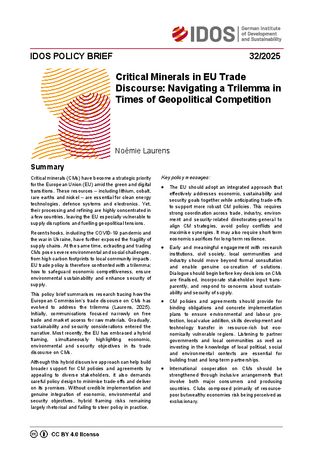Critical minerals in EU trade discourse: navigating a trilemma in times of geopolitical competition
Laurens, NoémiePolicy Brief (32/2025)
Bonn: German Institute of Development and Sustainability (IDOS)
DOI: https://doi.org/10.23661/ipb32.2025
Critical minerals (CMs) have become a strategic priority for the European Union (EU) amid the green and digital transitions. These resources – including lithium, cobalt, rare earths and nickel – are essential for clean energy technologies, defence systems and electronics. Yet, their processing and refining are highly concentrated in a few countries, leaving the EU especially vulnerable to supply disruptions and fuelling geopolitical tensions.
Recent shocks, including the COVID-19 pandemic and the war in Ukraine, have further exposed the fragility of supply chains. At the same time, extracting and trading CMs pose severe environmental and social challenges, from high carbon footprints to local community impacts. EU trade policy is therefore confronted with a trilemma: how to safeguard economic competitiveness, ensure environmental sustainability and enhance security of supply.
This policy brief summarises research tracing how the European Commission’s trade discourse on CMs has evolved to address the trilemma (Laurens, 2025). Initially, communications focused narrowly on free trade and market access for raw materials. Gradually, sustainability and security considerations entered the narrative. Most recently, the EU has embraced a hybrid framing, simultaneously highlighting economic, environmental and security objectives in its trade discourse on CMs.
Although this hybrid discursive approach can help build broader support for CM policies and agreements by appealing to diverse stakeholders, it also demands careful policy design to minimise trade-offs and deliver on its promises. Without credible implementation and genuine integration of economic, environmental and security objectives, hybrid framing risks remaining largely rhetorical and failing to steer policy in practice.
Key policy messages:
- The EU should adopt an integrated approach that effectively addresses economic, sustainability and security goals together while anticipating trade-offs to support more robust CM policies. This requires strong coordination across trade, industry, environment and security-related directorates-general to align CM strategies, avoid policy conflicts and maximise synergies. It may also require short-term economic sacrifices for long-term resilience.
- Early and meaningful engagement with research institutions, civil society, local communities and industry should move beyond formal consultation and enable genuine co-creation of solutions. Dialogue should begin before key decisions on CMs are finalised, incorporate stakeholder input transparently, and respond to concerns about sustainability and security of supply.
- CM policies and agreements should provide for binding obligations and concrete implementation plans to ensure environmental and labour protection, local value addition, skills development and technology transfer in resource-rich but economically vulnerable regions. Listening to partner governments and local communities as well as investing in the knowledge of local political, social and environmental contexts are essential for building trust and long-term partnerships.
- International cooperation on CMs should be strengthened through inclusive arrangements that involve both major consumers and producing countries. Clubs composed primarily of resource-poor but wealthy economies risk being perceived as exclusionary.

